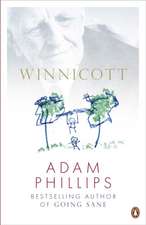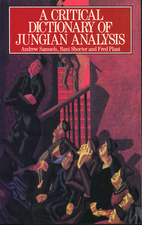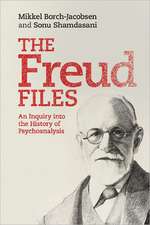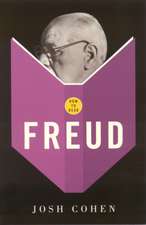What Freud Really Meant: A Chronological Reconstruction of his Theory of the Mind
Autor Susan Sugarmanen Limba Engleză Paperback – 3 apr 2016
| Toate formatele și edițiile | Preț | Express |
|---|---|---|
| Paperback (1) | 200.61 lei 3-5 săpt. | |
| Cambridge University Press – 3 apr 2016 | 200.61 lei 3-5 săpt. | |
| Hardback (1) | 550.71 lei 6-8 săpt. | |
| Cambridge University Press – 13 apr 2016 | 550.71 lei 6-8 săpt. |
Preț: 200.61 lei
Nou
Puncte Express: 301
Preț estimativ în valută:
38.39€ • 39.66$ • 31.93£
38.39€ • 39.66$ • 31.93£
Carte disponibilă
Livrare economică 27 februarie-13 martie
Preluare comenzi: 021 569.72.76
Specificații
ISBN-13: 9781107538559
ISBN-10: 1107538556
Pagini: 192
Dimensiuni: 151 x 228 x 12 mm
Greutate: 0.3 kg
Editura: Cambridge University Press
Colecția Cambridge University Press
Locul publicării:New York, United States
ISBN-10: 1107538556
Pagini: 192
Dimensiuni: 151 x 228 x 12 mm
Greutate: 0.3 kg
Editura: Cambridge University Press
Colecția Cambridge University Press
Locul publicării:New York, United States
Cuprins
Introduction; 1. Freud on psychoanalysis: 'Five Lectures on Psychoanalysis' (1909a); 2. The pleasure and reality principles: 'Formulations Regarding Two Principles in Mental Functioning' (1911); 'The Psychology of the Dream-Processes' from The Interpretation of Dreams (1900); 3. Ambivalence and the origin of the civilized mind: 'Taboo and Emotional Ambivalence' from Totem and Taboo (1913b); 4. Narcissism as stage in development: 'On Narcissism: An Introduction' (1914); 5. The impetus to the mind: 'Instincts and Their Vicissitudes' (1915a); 6. The possibility of repression: 'Repression' (1915b); 'Negation' (1925a); 7. The unconscious and the structure of the mind: 'The Unconscious' (1915c); 8. Beyond the pleasure principle: 'Beyond the Pleasure Principle' (1920); 9. A new architecture of the mind: 'The Ego and the Id' (1923); 10. Pleasure revised: 'An Economic Problem in Masochism' (1924); 11. Civilization, morality, and the pursuit of pleasure: 'Civilization and its Discontents' (1930); Epilogue: what Freud really meant.
Recenzii
'Here is the trajectory of Sigmund Freud's thought from early to late, and at the same time a delineation of its systematic structure; the story goes smoothly, widening like a river - an illuminating, eminently followable guide to one of the boldest investigations ever of how the human mind works.' Rüdiger Bittner, Universität Bielefeld, Germany
'Susan Sugarman's account is not only an affirmation of the complexity and depth of mind of one of the twentieth century's greatest thinkers, it is a remedy to the frequent mischaracterizations of the interpreters and critics of Freud who have preceded her. It is the tribute of one scholar to the magnificence of another.' Philip Costanzo, Duke University, North Carolina
'Sugarman offers a masterful, overarching account of the development of Freud's thought, stressing the coherence and systematic nature of his work and explaining the way his ideas evolved throughout his career. The book should serve as a touchstone for any future studies of Freud's theories.' Robert Schwartz, Distinguished Professor, University of Wisconsin, Milwaukee
'Susan Sugarman gives us a fearless and highly readable synthesis of Freud's evolving theory of mind. She is an exceptionally lucid writer; her clarity makes this book invaluable to the reader who wants to understand what Freud really meant. I particularly recommend it for teaching purposes, as it makes arcane information inviting and accessible.' Virginia R. Youngren, Harvard Medical School
'Sugarman skilfully guides her readers through Freud's writings and convincingly conveys that Freud's theory is indeed a complex and meaningful whole; far from reducing our mental lives to primitive instincts, Freud portrays the human mind as rich, subtle, and sophisticated.' Sebastian Petzolt, Metapsychology (www.metapsychology.mentalhelp.net)
'Susan Sugarman's account is not only an affirmation of the complexity and depth of mind of one of the twentieth century's greatest thinkers, it is a remedy to the frequent mischaracterizations of the interpreters and critics of Freud who have preceded her. It is the tribute of one scholar to the magnificence of another.' Philip Costanzo, Duke University, North Carolina
'Sugarman offers a masterful, overarching account of the development of Freud's thought, stressing the coherence and systematic nature of his work and explaining the way his ideas evolved throughout his career. The book should serve as a touchstone for any future studies of Freud's theories.' Robert Schwartz, Distinguished Professor, University of Wisconsin, Milwaukee
'Susan Sugarman gives us a fearless and highly readable synthesis of Freud's evolving theory of mind. She is an exceptionally lucid writer; her clarity makes this book invaluable to the reader who wants to understand what Freud really meant. I particularly recommend it for teaching purposes, as it makes arcane information inviting and accessible.' Virginia R. Youngren, Harvard Medical School
'Sugarman skilfully guides her readers through Freud's writings and convincingly conveys that Freud's theory is indeed a complex and meaningful whole; far from reducing our mental lives to primitive instincts, Freud portrays the human mind as rich, subtle, and sophisticated.' Sebastian Petzolt, Metapsychology (www.metapsychology.mentalhelp.net)
Notă biografică
Descriere
This book presents Freud's theory of the mind as an organic whole, built from first principles and developing in sophistication over time.



















